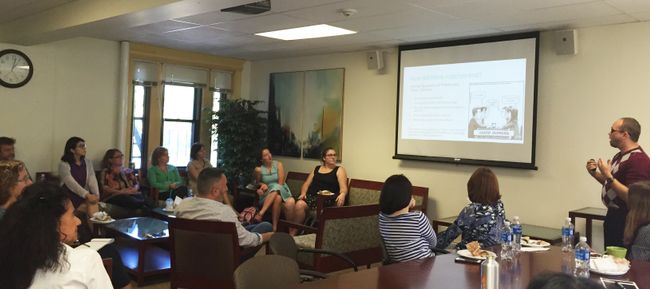Research Luncheon Seminar Series 2016-2017: Professor Renee Spencer Discusses STAR Project
“Mentors have to stick around,” BUSSW professor Renee Spencer told faculty and students at the first seminar of the Fall 2016 Research Luncheon Series on September 22 in the Conant Lounge.
Professor Spencer’s research focuses on adolescent development and youth mentoring. She presented One Story, Three Perspectives: A Qualitative Case-Based Approach to Understanding Early Ending Youth Mentoring Relationships, along with her doctoral crew— Grace Gowdy, Allison Drew, and John Paul Horn. Unlike many of the seminars of the past, Professor Spencer and her team gave a methods presentation on the STAR Project: Study To Analyze Relationships, as the process is ongoing.

The STAR Project is a research study funded by a Mentoring Best Practices Research grant from the Office of Juvenile Justice and Delinquency Prevention to researchers at Portland State University (Thomas Keller, PI) and Boston University (Renee Spencer, Co-PI) and is conducted in collaboration with Big Brothers Big Sisters of America and selected local agencies within the Big Brothers Big Sisters Network. It is a multi-method longitudinal study tracking the course of new mentoring relationships with the goal of investigating how individual participant characteristics, relationship processes, and program practices influence the development and duration of youth mentoring relationships.
 Professor Spencer began by explaining the perception of mentoring, how people often see and talk about it as important and positive. She continued with the tale of two relationships – one where the match lasted for eight years, developed into long standing relationship and the mentor was present on graduation day; the other where the mentee had been through two mentors that did not stick. “These are the stories we don’t tell, the ones that don’t work out,” Spencer said. “And this is why we became interested in this.”
Professor Spencer began by explaining the perception of mentoring, how people often see and talk about it as important and positive. She continued with the tale of two relationships – one where the match lasted for eight years, developed into long standing relationship and the mentor was present on graduation day; the other where the mentee had been through two mentors that did not stick. “These are the stories we don’t tell, the ones that don’t work out,” Spencer said. “And this is why we became interested in this.”
According to the presentation, as many as a third to a half of mentor relationships end early. Often, a lot of attention to mentor relationships is paid upfront to the matching process and not endings, even in research. The STAR Project’s goal is to not only look at endings, but to prevent early endings and promote long lasting relationships. By analyzing the “trifecta” (the match support specialist, the parent or guardian, and the mentor) of perspectives on the match, the team looks to answer two questions: Why do the matches end? And how? “Matches don’t exist in a vacuum,” doctoral student Grace Gowdy points out, all aspects of the environment need to work together in order for it to function and succeed. Ultimately, the hope is that the findings of the STAR project will provide information helping programs to implement practices that support strong, long-lasting mentoring relationships.